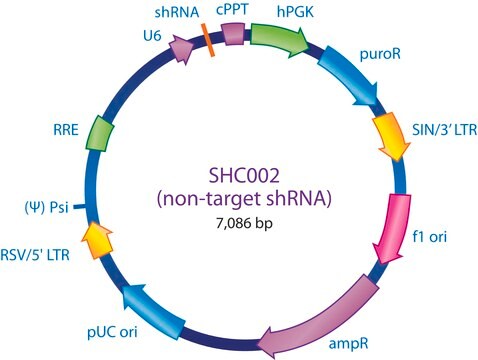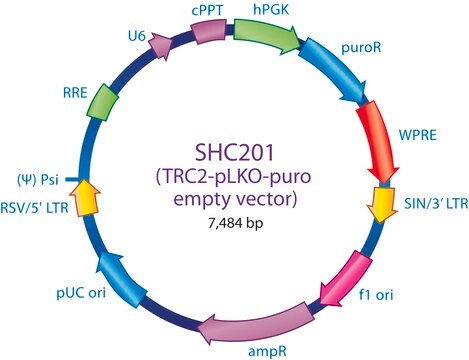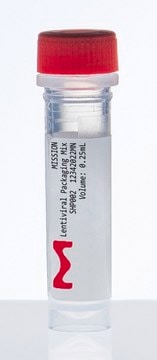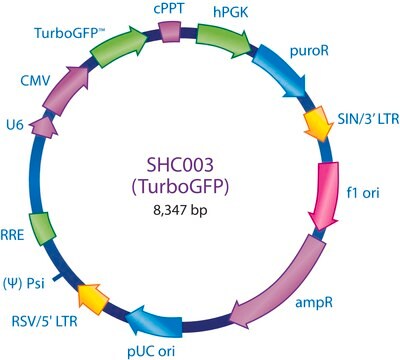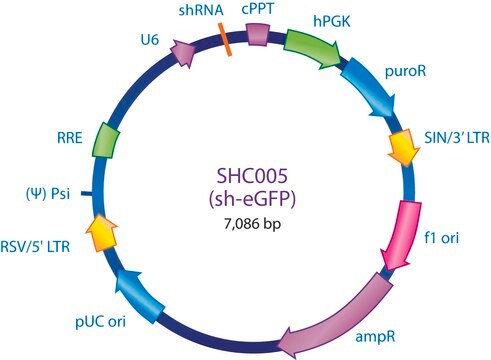SHC001
MISSION® pLKO.1-puro Empty Vector Control Plasmid DNA
Contains no shRNA insert
Synonym(s):
MISSION® Control Vectors
Sign Into View Organizational & Contract Pricing
All Photos(1)
About This Item
Recommended Products
Quality Level
product line
MISSION®
concentration
500 ng/μL in TE buffer; DNA (10μg of plasmid DNA)
shipped in
dry ice
storage temp.
−20°C
Looking for similar products? Visit Product Comparison Guide
General description
The MISSION pLKO.1-puro Control Vector is a lentivirus plasmid vector. The vector does not contain an shRNA insert and is useful as a negative control in experiments using the MISSION shRNA library clones. This allows one to examine the effect of transfection on gene expression and interpret the knockdown effect seen with shRNA clones. Ampicillin and puromycin antibiotic resistance genes provide selection in bacterial or mammalian cells respectively. In addition, self-inactivating replication incompetent viral particles can be produced in packaging cells (HEK293T) by co-transfection with compatible packaging plasmids. The pLKO.1-puro Control Vector is provided as 10 μg of plasmid DNA in Tris-EDTA (TE) buffer at a concentration of 500 ng/μl.
Application
MISSION® pLKO.1-puro Empty Vector Control Plasmid DNA has been used to synthesize and clone shRNAs (which target murine cluster of differentiation 36 (CD36), to generate lentiviral expression vectors.
To see more application data, protocols, vector maps visit sigma.com/shrna.
Legal Information
Use of this product is subject to one or more license agreements. For details, please see http://sigmaaldrich.com/missionlicense.
MISSION is a registered trademark of Merck KGaA, Darmstadt, Germany
recommended
Storage Class Code
12 - Non Combustible Liquids
WGK
WGK 1
Flash Point(F)
Not applicable
Flash Point(C)
Not applicable
Certificates of Analysis (COA)
Search for Certificates of Analysis (COA) by entering the products Lot/Batch Number. Lot and Batch Numbers can be found on a product’s label following the words ‘Lot’ or ‘Batch’.
Already Own This Product?
Find documentation for the products that you have recently purchased in the Document Library.
Jacqueline A Brosnan-Cashman et al.
PloS one, 13(9), e0204159-e0204159 (2018-09-19)
Cancers must maintain their telomeres at lengths sufficient for cell survival. In several cancer subtypes, a recombination-like mechanism termed alternative lengthening of telomeres (ALT), is frequently used for telomere length maintenance. Cancers utilizing ALT often have lost functional ATRX, a
Cardiospecific CD36 suppression by lentivirus-mediated RNA interference prevents cardiac hypertrophy and systolic dysfunction in high-fat-diet induced obese mice.
Zhang Y
Cardiovascular Diabetology, 14 (2015)
AMP-activated protein kinase (AMPK)-induced preconditioning in primary cortical neurons involves activation of MCL-1.
Anilkumar U
Journal of Neurochemistry, 124 (2013)
Yu Fujita et al.
Cell reports, 24(12), 3296-3311 (2018-09-21)
Inflammatory bowel disease (IBD) is prevalent, but the mechanisms underlying disease development remain elusive. We identify a role for the E3 ubiquitin ligase RNF5 in IBD. Intestinal epithelial cells (IECs) express a high level of RNF5, while the colon of
Gregory J Baker et al.
Cancer research, 74(18), 5079-5090 (2014-07-20)
Natural killer (NK) cells safeguard against early tumor formation by destroying transformed target cells in a process referred to as NK immune surveillance. However, the immune escape mechanisms used by malignant brain tumors to subvert this innate type of immune
Our team of scientists has experience in all areas of research including Life Science, Material Science, Chemical Synthesis, Chromatography, Analytical and many others.
Contact Technical Service
